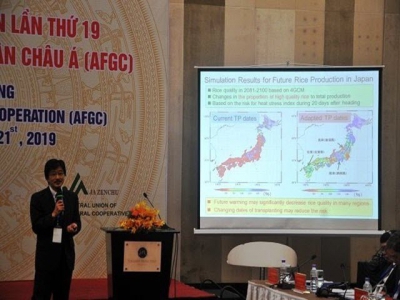Wet rice farming increases greenhouse emissions: expert

DANANG – Methods of farming wet rice in Southeast Asia have resulted in a vast increase in greenhouse gas emissions, posting a major climate change challenge for the agricultural sector in the region.
Kazuyuki Yagi, an agriculture and environment expert from Japan, speaks at the 19th annual meeting held in Danang City on March 20 – PHOTO: NHAN TAM
Of all 10 countries in Southeast Asia, Vietnam, Thailand and Indonesia take the top spots, accounting for 78% of greenhouse gas emissions in the region, according to statistics cited by Kazuyuki Yagi, a Japanese agriculture and environment expert, at the 19th annual meeting held by the Asian Farmers Group for Cooperation from March 20 to 21 in Danang City.
The total greenhouse gases, mainly methane, emitted from rice paddies in the Southeast Asian region amounted to 150,000 Gg CO2-equivalent, Yagi noted, adding that the volume of methane would rise if rice farms are flooded.
“The Southeast Asian countries mainly farm wet rice under the traditional method where rice fields are flooded, causing large volumes of gases to be emitted,” Yagi remarked.
In addition, Yagi stated that his group had launched in-field research studies in Japan, Indonesia, the Philippines, Thailand and Vietnam and had proposed the four countries in the Southeast Asian region jointly deploy a project to review the humidity and dryness of their soil to reduce greenhouse gas emissions from their rice fields.
Alternate Wetting and Drying is a water-saving technology that farmers from these countries can apply to reduce their irrigation water consumption in rice fields when water levels drop, he said.
Besides this, Yagi suggested that countries, especially those in Asia, should execute a climate-smart agriculture project with three main goals: beefing up sustainable outputs, building solutions to cope with climate change and minimizing greenhouse gas emissions from the agricultural sector.
“Global warming is worsening the Asian region. If no urgent measures are adopted, the temperature in the region will rise at least one degree Celsius, negatively affecting the agriculture industry,” he stated.
Related news
 Vietnam coffee prices fall as drought continues; supplies build up in Indonesia
Vietnam coffee prices fall as drought continues; supplies build up in Indonesia Vietnam coffee prices fell this week amid weakness in global robusta, as local farmers continued to face water shortage, while Indonesia witnessed supply
 Rice exports to Angola soar over two-month period
Rice exports to Angola soar over two-month period Rice shipments to the African nation of Angola during January and February leapfrogged by nearly 19 times in volume and 9.5 times in value against the same
 Creating favourable environment for attracting agricultural investment
Creating favourable environment for attracting agricultural investment The policies are being implemented right from their promulgation and have been continuously improved towards creating a more convenient environment for investor